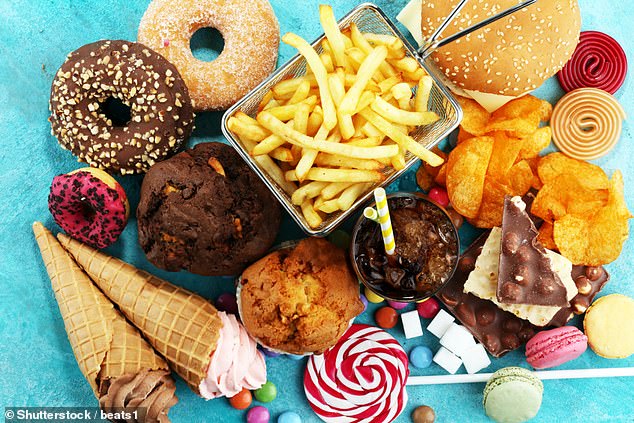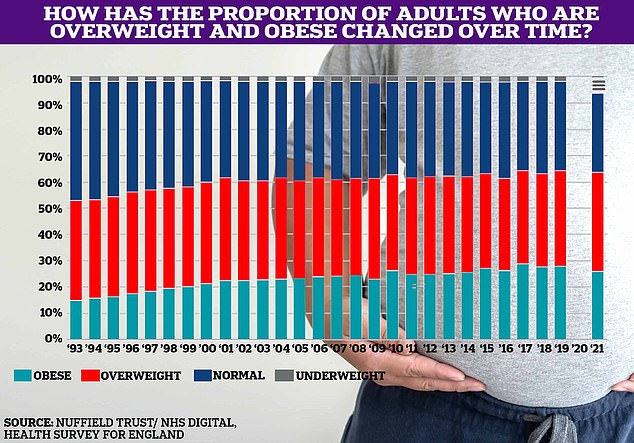One in five Britons (around 10 million adults) may be addicted to junk food, top doctors say.
Experts say that being addicted to ultra-processed junk is as dangerous as being dependent on alcohol, tobacco or even drugs like cocaine.
Cheap UPFs such as biscuits, cakes and crisps are thought to have fueled Britain’s growing obesity crisis.
Dr Jen Unwin, former food addict and chartered clinical and health psychologist, said: “We are sleepwalking towards a public health disaster.”
‘Although 20 per cent of adults may meet the criteria for food addiction, specifically addiction to ultra-processed foods, it is not a recognized clinical diagnosis.

Experts estimate that up to 10 million Britons, around a fifth of England’s population, could be addicted to junk food despite knowing it harms them.
“However, it is getting worse and putting unsustainable pressure on the NHS.”
Dr. Unwin is part of the Public Health Collaboration, which wants the World Health Organization (WHO) to classify junk food addiction as a substance use disorder.
Respected experts, including Dr Chris van Tulleken, will meet next month at the International Consensus Conference on Food Addiction to push the situation forward.
If successful, it will mean that UPF will be placed at a level similar to that of addictive and harmful substances such as cocaine, opioids, nicotine and alcohol.
This could lead to calls for junk food and UPF addicts to be sent to rehabilitation clinics or receive expert advice, for example.
UPFs refer to items on supermarket shelves that contain ingredients that people would not normally add when cooking homemade food.
These additions can include chemicals, dyes, sweeteners and preservatives that extend shelf life.
It comes amid growing concern about UPFs and the impact they have on health, as foods such as junk food and convenience foods are often high in salt, fat and sugar.
Overall, two-thirds of all British adults are now overweight, compared to just half in the mid-1990s. Of these, a quarter are obese.
The figures for children are not much better. The latest data on childhood obesity in England shows that one in 10 children are too fat by the time they start primary school, a figure which rises to around one in four among those in year six.
The obesity crisis is not only robbing the nation of its health, it is also estimated to be costing us almost £100bn a year.
This figure includes health damage to the NHS, as well as secondary economic effects such as loss of income due to people taking time off work due to illness and premature death.
Experts have asked ministers to confront the crisis, demanding that action be taken against both litter and UPF with the same aggressiveness that the Government has dedicated to tobacco.
Ministers hope a wave of new anti-obesity drugs, such as the weight-loss hit Ozempic, will help turn the tide and get more Britons back to work.
The so-called food addiction is characterized by six signs, according to the Daily Express.
These are cravings and compulsions to consume the substance/action, increasing amounts to satisfy the craving, lack of control over the amount consumed, withdrawal symptoms when trying to reduce it, continued use despite knowing the harms and neglecting other aspects of its consumption. life to feed the habit.
The Daily Express reports that the five most problematic foods for food addicts are pizza, chocolate, crisps, biscuits and ice cream.
The NHS does not classify junk food or UPF addiction as a specific condition.
However, it does list binge eating disorder, in which people regularly eat a large amount of food over a short period of time until they feel uncomfortably full, as an eating disorder. But it doesn’t mention what kinds of foods patients are likely to eat.
Your browser does not support iframes.
Your browser does not support iframes.
Your browser does not support iframes.
The UK is the worst country in Europe for UPF consumption, making up about 57 per cent of the national diet, according to a survey.
However, some experts have warned against placing too much blame on the UPF for all of the UK’s health problems.
They say part of the complexity of the problem is that people who consume large amounts of UPF tend to be poorer and less healthy overall.
This makes it difficult to determine whether UPF consumption is directly harmful or, conversely, is an indicator or contributing factor to poor health.
Another problem that critics have pointed out is how nebulous the term UPF is, both in public discourse and in research on the topic.
On its own, the term UPF does not distinguish between an unhealthy prepared meal, full of fat, salt and sugar, and a loaf of whole wheat bread that has some health benefits.


The proportion of Britons who are overweight or obese has slowly increased over time, reaching two-thirds in 2021, the latest data available. No data was recorded for 2020, the year of the Covid pandemic.
Being too fat has been shown to cause or exacerbate a host of health problems.
These include the risk of cancer, high blood pressure and cardiovascular disease, as well as type 2 diabetes and depression.
There have been government plans to limit the amount of junk food advertising in England.
Unveiled by former Prime Minister Boris Johnson, the move would have seen a complete ban on online junk food ads and a 9pm milestone for junk food TV ads from 2023.
But current Prime Minister Rishi Sunak delayed the policy until 2025.
Mr Sunak He said he wanted to give the industry more time to prepare for the change as the reason for the delay.
